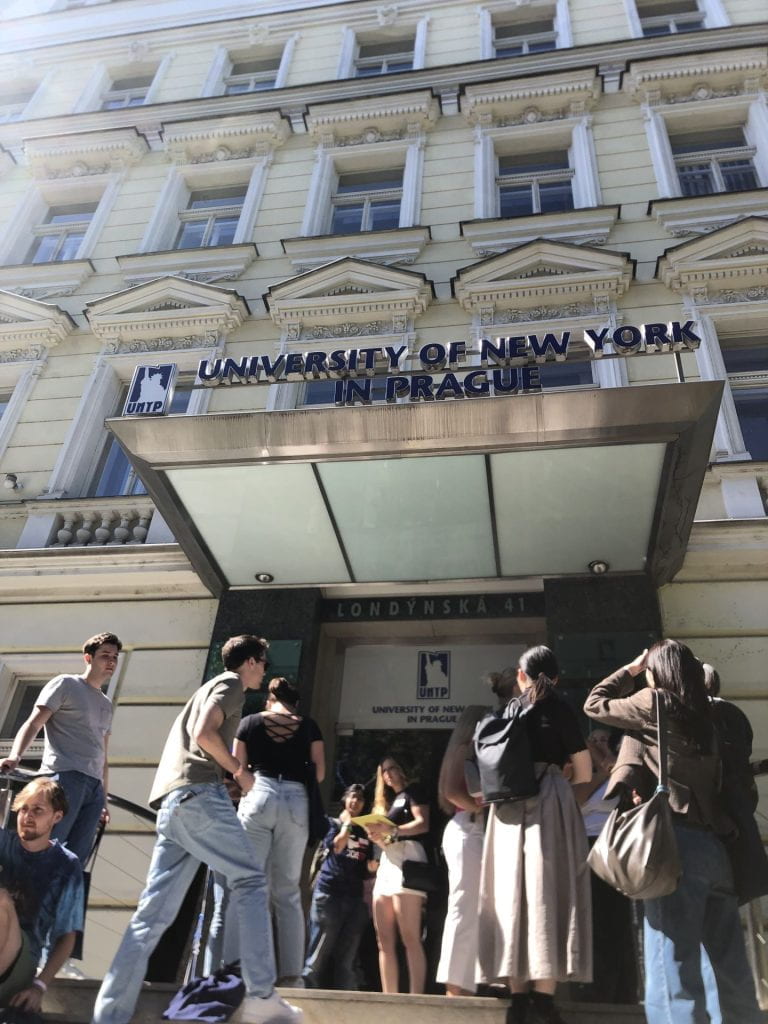
For those of you who I’ve talked to about my classes, you’ll know the contents of this post have been brewing in my mind for a while—nearly the whole semester. One might question my decision to write about school culture and values disputes in this travel blog, but I’m including it because 1) it’s been a meaningful part of my study abroad experience, and 2) future study abroad students may encounter similar situations when they attend a new school abroad. I’ve written about UNYP and my classes before in this blog, but this post will be a deeper dive into my teachers’ methods, cheating/AI use, impressions of my classmates, and my recurring surprises/difficulties regarding classroom discussions. Also, before continuing, this is all based on my limited experiences with the school, but many of the things I’ll mention have also been noticed by other students and professors I’ve talked to.
My teachers:
All of my professors seem like very cool and accomplished people. They all also have interesting careers. An issue that arises from their busy careers, however, is that teaching their classes sometimes seems like an afterthought. Most teachers appear to be professionals first, and professors second. I obviously can’t begrudge UNYP’s faculty for having multiple paid jobs to focus on, but they don’t seem to make their classes their own. From what I can tell, UNYP’s courses have a common structure including lectures, presentations, group projects, and final exams, and most teachers don’t bother altering or tailoring that structure to match the focus of the course. As a result, I have classes that are project-based, including a large final project, but which still include a final exam tacked on to the end. These redundant exams seem to be there because they’re “supposed” to be, not because they showcase our knowledge. Student presentations are such a big part of every class that a large chunk of in-person class is just listening to my peers present about something the teacher could undoubtedly explain much better, while said teacher types on their computer and does other work. I have to exclude my music psychology professor from this rather unflattering portrait, because his teaching style makes it clear that he cares about his subject and students, and he uses a unique class structure. He deserves a lot of credit for being a great teacher, but I also believe that his teaching isn’t revolutionary; it should be normal. But at UNYP, it’s not.
AI:
This may be a result of AI’s rapidly growing popularity, but I’ve noticed much more use of ChatGPT here than at my home university. Even for tasks like small group discussion prompts, I see students immediately type the question into ChatGPT and use its answers. While this avoidance of thinking for oneself is unsettling, I have to say that students aren’t only using it to cheat; it seems to be a useful tool for compiling areas of further research based on a particular subject. I’ve also seen students enter their own writing into ChatGPT to ask for editing suggestions. In that case, it doesn’t seem quite like cheating—more like a very advanced Grammarly Premium. Even though people aren’t always using AI for literal cheating, the prevalence of it gives me an unfortunate sense of doubt every time I see my classmates’ work.

Grappling with closed-mindedness:
This section just refers to my Sex and Gender class and Global Sustainability class.
At the beginning of the semester, I was excited to learn about gender studies and environmental studies (ENVS) from a European point of view, because I assumed UNYP’s international perspective would provide more progressive and culturally inclusive information than I’ve received in the US. You can imagine my surprise when I entered these classes and my classmates didn’t identify as feminists, and said things like “the body positivity movement just wants people to be unhealthy,” and thought the evidence about climate change was too inconclusive to reduce fossil fuel use (and the list goes on). One of my favorite examples was my ENVS classmate arguing that dinosaurs produced more CO2 than humans, so climate change isn’t our fault. Another good example that just makes me sad is when several classmates spent an hour denying that they were denying human culpability in climate change, in the most circular and depressing class debate I’ve ever had to listen to. In general, my gender class sometimes feels like a “women in the workplace” seminar being given to reluctant male employees, and my environmental studies class has gone about as well as you’d expect “environmental studies for teenage boys with an interest in economics” to go. I can’t help but feel like I’ve gone back in time here. Since when are veganism and renewable energy still controversial?
My issue is not that students come to these classes without knowledge of the subject matter; it’s that despite the information given about climate change or gender theory, they don’t budge an inch in their preconceived attitudes. So the business students come in wondering if humans are causing climate change and after the evidence in class gives a resounding YES, they’re still skeptical.
Several particular patterns of thought come up again and again in both my gender and ENVS classes. I’ll describe them below, because I think the striking similarity between the discussions in these two seemingly unrelated classes points to mental patterns shared by many of UNYP’s students.
One example is the non-sequitur. In nearly every discussion, one of my classmates abruptly shifts the topic of conversation to something irrelevant, and the debate will continue from there, the original point of conversation forgotten. For example, my Sex and Gender class watched a short video about how men have an irrational belief that veganism makes them less manly. Following this, a few of my classmates immediately voiced their disagreement, saying that vegan men are less manly, and humans were made to be predators, etc etc. These comments are insane to me but at least they’re on topic, right? Soon after this, though, someone said something along the lines of: “But women wear lots of makeup, and makeup is tested on animals, so they’re really just as bad as the men who eat animals and they should take responsibility for that.” Naturally, from here, the conversation was no longer about masculinity and meat eating, but about the makeup industry and the “hypocrisy” of women for buying makeup while advocating for less meat consumption. This change in topic successfully shifted the conversation away from toxic masculinity, and therefore took the men out of the hot seat. We should talk about the makeup industry in animal cruelty discussions, but it’s obvious that in this particular case, the inclusion of this topic did not add nuance to the conversation; it purely shifted the topic away from something that the men found uncomfortable to speak about. As I said earlier, these bizarre discussion topic changes happen in almost every conversation, but it would take too much space to describe more, so I will move on.
Another pattern is nihilism, which I’ve noticed most prominently in environmental studies. Students will say something extremely pessimistic and the discussion will end there. There have been many ENVS discussions where the intellectual trail ends with “We can’t do anything for the environment, because the people in charge of fossil fuels will never choose the good of the future over immediate profit.” This is a rational statement, and could be true, but in environmental studies, we’re never supposed to end the conversation there. The whole point of ENVS as a discipline is to look past that sentiment and continue with something like “But here are some things people are doing to help,” or “Human nature is not exclusively selfish,” or “The gridlock of doubt is artificial and manufactured by the institutions who profit from business as usual; change is possible.” At my home school, nihilistic nosedives would usually be where the teacher jumps in to bring the class back on track, or offer some much-needed facts about the topic at hand, but that hasn’t been happening. It’s difficult to manage classroom debates, especially for UNYP professors who aren’t primarily trained as educators, but I think the professors have a responsibility to take an active role in moderating discussions and guiding them to new intellectual territory. Here’s an example of a time when my ENVS professor missed an opportunity to dig us out of a nihilistic discussion: My classmates were stuck in a rut, repeating that it would be impossible to transition away from fossil fuels, so we shouldn’t even bother trying. My professor joined the conversation by saying something like “Did you guys hear that someone made the first solar-powered plane? It was so slow hahaha.” It took all of my willpower not to roll my eyes at that.
I’ve been wondering if the prevalence of non-sequitur and nihilism are products of a cultural mindset here in the Czech Republic. On one hand, there are notable exceptions to these patterns; several Czech people I’ve become friends with are equally frustrated by the things people say in class. So it would be unfair to generalize and say that these are Czech traits. After all, it’s not just Czech people who have brought closed-minded attitudes to class. On the other hand, I saw during my research this summer that Czechs have a reputation for being a little blunt, and for not shying away from dark humor or polarizing statements. So perhaps the Czech classmates who perpetuate the problems I’ve been describing are doing so because it’s normal to be oppositional. For example, I’ve noticed that the Czech students who say the most offensive things tend to play devil’s advocate during all topics of conversation, not just controversial topics. It’s almost like they don’t even believe what they’re saying.
Separating ideas from students and the accompanying mental whiplash:
Even though listening to people I disagree with is hard to deal with, it’s arguably been more difficult to deal with the fact that sometimes my classmates are completely likable people. One second they’re saying something that makes me vexed; next they’re being completely thoughtful and tolerant; next they’re saying something I reluctantly agree with. I’ve been wondering if I can separate my peers’ words from my opinion of them as people, and I still don’t know. As I mentioned in the previous paragraph, it seems like they’re just saying things for the sake of disagreeing, not because they’re supporting their values. It feels wrong for me to be infuriated by them one day, and admiring their class presentation the next day, but that’s what happens. Not only do I fume at my peers in class, I also want them to like me. It’s too much for me to handle. I’m very confused.

Conclusions??
This semester’s classes have been very valuable for me. So far, UNYP has given me an education in debate, and allowed me to gain a more nuanced understanding of the minds of people I disagree with. I’ve had to work on my open-mindedness this semester. I’ve realized that in academic settings, I’ve never been faced with people who are this antagonistic toward the goals of the classes (gender/LGBTQ acceptance and sustainable progress). At the beginning of the semester, I was tempted to write off my argumentative peers as morally wrong/old-fashioned/intractable, but as we’ve had more discussions in class, I’ve tried to look at them in a positive light. Doing so has helped me recognize the nuance of their views, and resist spiteful debates in class. I doubt I would have noticed any thoughtful or reasonable words of theirs if I had been primed to dislike everything they said.
Regarding UNYP in general, I’m grateful to have met many interesting people and professors here. As I said before, I’m also glad that I’ve experienced interacting with people I disagree with. That’s probably the most positive thing I can say about the school. But regardless of the quality of UNYP, I’m incredibly grateful for the opportunity it gave me: to come here to Prague.

